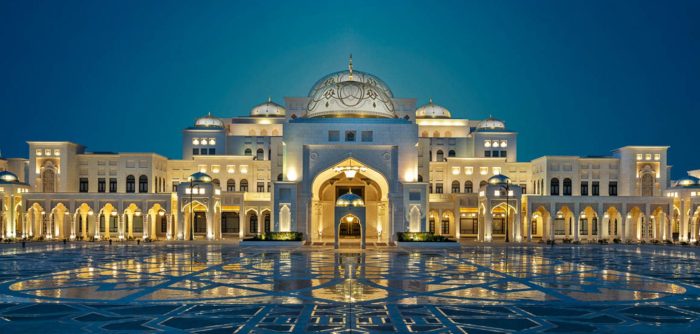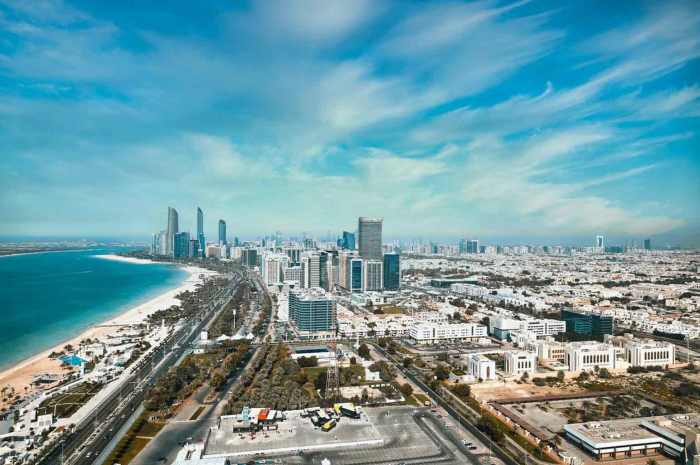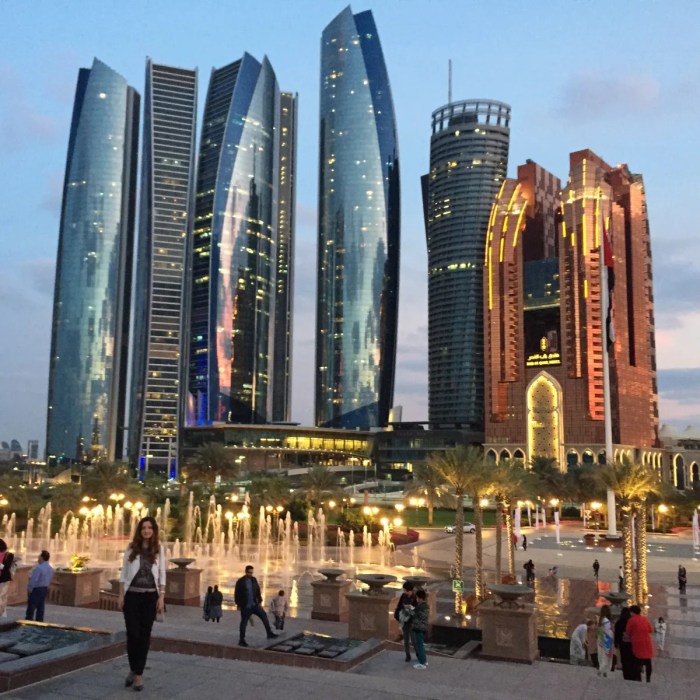Abu Dhabi Time sets the stage for this enthralling narrative, offering readers a glimpse into a story that is rich in detail and brimming with originality from the outset. As we delve into the intricacies of timekeeping in Abu Dhabi, we uncover a tapestry woven with cultural traditions, economic implications, and historical significance that has shaped the very fabric of this vibrant city.
From the meticulous methods employed by the Emirates Authority for Standardization and Metrology (ESMA) to ensure accuracy and reliability to the profound influence of Islamic traditions on time perception, Abu Dhabi Time offers a unique lens through which we can explore the complexities of time management in a rapidly evolving global landscape.
Abu Dhabi Time Zone
Abu Dhabi, the capital city of the United Arab Emirates, observes the Gulf Standard Time (GST), which is three hours ahead of Coordinated Universal Time (UTC). Daylight saving time is not observed in Abu Dhabi or the United Arab Emirates.
Comparison with Other Time Zones in the Region
The following table compares the time zones of Abu Dhabi and other major cities in the region:
| City | Time Zone | UTC Offset |
|---|---|---|
| Abu Dhabi | Gulf Standard Time (GST) | +3:00 |
| Dubai | Gulf Standard Time (GST) | +3:00 |
| Doha | Arabia Standard Time (AST) | +3:00 |
| Riyadh | Arabia Standard Time (AST) | +3:00 |
| Cairo | Eastern European Time (EET) | +2:00 |
Timekeeping in Abu Dhabi

Timekeeping in Abu Dhabi is essential for various activities, including business, transportation, and daily life. The Emirates Authority for Standardization and Metrology (ESMA) is responsible for ensuring the accuracy and reliability of timekeeping systems in the emirate. ESMA uses atomic clocks as the primary reference for timekeeping, which are highly accurate and provide a stable time signal. The time signal is then distributed to various devices, such as clocks, watches, and computer systems, through a network of time servers.
ESMA’s Role in Timekeeping
ESMA plays a vital role in ensuring the accuracy and reliability of timekeeping in Abu Dhabi. The authority is responsible for:
- Maintaining the official time for the emirate
- Calibrating and certifying timekeeping devices
- Providing technical support and advice on timekeeping matters
ESMA’s efforts ensure that timekeeping systems in Abu Dhabi are accurate and reliable, which is essential for various activities and services in the emirate.
Historical Significance of Time in Abu Dhabi

Time has played a crucial role in shaping the history and culture of Abu Dhabi. The city’s Islamic heritage has significantly influenced timekeeping practices, and the discovery of oil has had a profound impact on the perception of time.
Influence of Islamic Traditions
Islamic traditions have deeply influenced the way time is perceived and measured in Abu Dhabi. The Islamic calendar, based on lunar cycles, is still widely used in the city. The five daily prayers prescribed by Islam serve as time markers throughout the day. The call to prayer, known as the “adhan,” echoes through the city at specific times, reminding people of the importance of punctuality and the passage of time.
Impact of Oil Discovery
The discovery of oil in the 1950s had a transformative effect on time perception in Abu Dhabi. The influx of wealth and rapid modernization led to a shift from a traditional, agricultural society to a modern, industrialized one. Time became a valuable commodity, and punctuality and efficiency became highly valued traits. The construction of modern infrastructure, such as roads and airports, facilitated faster travel and communication, further emphasizing the importance of time management.
Cultural Impact of Abu Dhabi Time

Abu Dhabi’s unique time zone has a profound impact on the daily lives of its residents and visitors alike. Time plays a crucial role in shaping cultural practices, religious observances, social interactions, and business transactions within the emirate.
With the sun setting early in Abu Dhabi, families seeking a memorable getaway can unwind at one of the city’s many family-friendly resorts. These resorts offer a range of activities tailored to children, ensuring an unforgettable experience. As the evening draws to a close, families can return to the serene ambiance of Abu Dhabi, where the twinkling lights of the city create a magical backdrop for cherished moments.
The precise timing of religious practices, such as the five daily prayers in Islam, is of utmost importance in Abu Dhabi. The call to prayer, known as the adhan, is broadcast from mosques throughout the city, signaling the start of each prayer time. Businesses and government offices adjust their schedules accordingly, allowing employees to observe their religious duties without disruption.
Social Events
Time also plays a significant role in social events within Abu Dhabi. Traditional gatherings, such as family dinners and celebrations, often adhere to specific timeframes. Punctuality is highly valued, and guests are expected to arrive at the appointed time. Social events often revolve around shared meals, and the timing of these meals is crucial to ensure that everyone can participate fully.
Business Transactions
In the business realm, time is of the essence. Abu Dhabi’s strategic location as a global business hub demands adherence to international time standards. Businesses operate on a precise schedule, with meetings, appointments, and deadlines carefully planned. Punctuality and reliability are highly valued in business transactions, and adhering to agreed-upon timeframes is essential for maintaining professional relationships.
Perception of Time
The perception of time in Abu Dhabi differs from that in many other cultures. While punctuality is generally valued, there is a greater emphasis on patience and flexibility. This is particularly evident in social situations, where conversations and interactions often flow at a more relaxed pace. The concept of “Arabian time” acknowledges that time is not always a rigid construct, and it is acceptable to be slightly late for certain social events.
Economic Impact of Abu Dhabi Time

Abu Dhabi’s time zone plays a crucial role in shaping the city’s economic landscape. Timeliness and efficiency are highly valued in international business and tourism, and Abu Dhabi’s alignment with global time standards facilitates seamless interactions with other economic hubs.
As the sun dips below the horizon in Abu Dhabi, casting a warm glow over the city, it’s time to escape to the pristine shores of the Caribbean. From the turquoise waters of Grand Cayman to the sugar-white sands of Barbados, the best beaches in the Caribbean offer a blissful retreat.
As you return to Abu Dhabi, the memory of the Caribbean’s allure will linger, reminding you of the beauty that awaits beyond your doorstep.
Productivity and Efficiency
Adhering to a standardized time zone promotes productivity and efficiency in Abu Dhabi. Businesses can plan meetings, schedule deliveries, and coordinate operations with international partners without facing time zone-related delays or misunderstandings. This streamlined communication enhances productivity and optimizes resource allocation.
Challenges and Opportunities for Abu Dhabi Time

Abu Dhabi, as a thriving global metropolis, faces unique challenges and opportunities in managing time effectively. This section will explore these aspects, highlighting areas for improvement and innovative solutions to enhance timekeeping and efficiency in the city.
Challenges
- Time Zone Discrepancies: Abu Dhabi’s location in the United Arab Emirates (UAE) places it in the Gulf Standard Time (GST) zone, which is three hours ahead of Coordinated Universal Time (UTC). This time difference can create challenges for businesses and individuals interacting with global partners operating in different time zones.
- Cultural Influences: Abu Dhabi’s rich cultural heritage and religious observances can impact timekeeping practices. For instance, during the holy month of Ramadan, fasting and prayer times influence work schedules and daily routines.
- Traffic Congestion: Abu Dhabi’s growing population and infrastructure development have led to increased traffic congestion. This can significantly affect commute times and impact punctuality for appointments and meetings.
Opportunities
Despite these challenges, Abu Dhabi has a wealth of opportunities to improve timekeeping and efficiency:
- Technological Advancements: Embracing innovative technologies, such as cloud-based time management systems and mobile applications, can streamline time tracking, scheduling, and communication.
- Flexible Work Arrangements: Implementing flexible work arrangements, such as remote work and staggered work hours, can reduce commute times and improve work-life balance.
- Public Transportation Enhancements: Investing in efficient public transportation systems can reduce traffic congestion and improve punctuality for commuters.
Innovative Solutions
To address the challenges and capitalize on the opportunities, Abu Dhabi can explore innovative solutions:
- Time Zone Optimization: Exploring alternative time zone arrangements, such as adopting a more globally aligned time zone, could reduce time zone discrepancies and improve international business interactions.
- Smart City Initiatives: Leveraging smart city technologies, such as real-time traffic monitoring and intelligent traffic management systems, can help mitigate traffic congestion and improve commute times.
- Time Awareness Campaigns: Implementing public awareness campaigns to promote the importance of punctuality and efficient time management can foster a culture of timeliness and respect for others’ schedules.
Case Studies

Abu Dhabi has witnessed remarkable success in implementing time management practices. Let’s explore some notable case studies and the strategies they employed to optimize time utilization.
As the sun sets in Abu Dhabi, casting a warm glow over the city’s skyline, it’s time to unwind and escape to the serene shores of the Caribbean. Discover the best beaches in the Caribbean , where crystal-clear waters, pristine sands, and swaying palm trees await.
From the vibrant shores of Jamaica to the tranquil bays of St. Lucia, there’s a Caribbean beach perfect for every traveler seeking a slice of paradise. As night falls in Abu Dhabi, the memories of Caribbean sunsets and ocean breezes will linger, creating a perfect end to the day.
One prominent example is the Abu Dhabi National Oil Company (ADNOC). ADNOC implemented a comprehensive time management program that involved setting clear goals, prioritizing tasks, and utilizing technology to streamline processes. This resulted in a significant reduction in project timelines and improved overall efficiency.
Mubadala Investment Company, Abu dhabi time
Mubadala Investment Company, a sovereign wealth fund in Abu Dhabi, adopted a time management framework that focused on delegation, effective communication, and employee training. By empowering employees to take ownership of tasks and fostering a collaborative work environment, Mubadala enhanced productivity and achieved its strategic objectives more efficiently.
Abu Dhabi Airport
Abu Dhabi Airport implemented a real-time passenger tracking system that enabled them to optimize passenger flow and reduce waiting times. This system provided valuable insights into passenger behavior, allowing the airport to allocate resources effectively and improve the overall passenger experience.
Emirates Post
Emirates Post, the national postal service of the UAE, introduced a route optimization software that helped plan delivery routes more efficiently. This resulted in reduced delivery times, improved customer satisfaction, and cost savings for the organization.
These case studies demonstrate the transformative impact of effective time management practices in Abu Dhabi. By adopting innovative strategies and utilizing technology, organizations have been able to enhance productivity, improve efficiency, and achieve their goals more effectively.
Future of Timekeeping in Abu Dhabi

The future of timekeeping in Abu Dhabi is expected to be shaped by advancements in technology and the city’s commitment to innovation.
Emerging technologies such as artificial intelligence (AI), blockchain, and the Internet of Things (IoT) are expected to play a significant role in enhancing time management practices. AI-powered systems can automate time-consuming tasks, while blockchain technology can provide secure and transparent record-keeping. IoT devices can collect data on time usage, enabling organizations to optimize their schedules and improve productivity.
Abu Dhabi is well-positioned to lead the way in the future of timekeeping. The city has a strong track record of investing in technology and infrastructure, and it is home to a number of research and development centers focused on timekeeping innovation. Additionally, Abu Dhabi’s strategic location at the crossroads of the East and West makes it an ideal hub for collaboration and knowledge sharing on timekeeping best practices.
Conclusion

As we conclude our exploration of Abu Dhabi Time, it is evident that time is not merely a measure of seconds, minutes, and hours but a multifaceted concept that permeates every aspect of life in this dynamic city. From the bustling streets to the boardrooms, from religious practices to social interactions, time serves as an invisible yet powerful force that shapes our experiences and interactions.
Looking ahead, Abu Dhabi is poised to continue its journey as a pioneer in timekeeping innovation, embracing emerging technologies and exploring creative solutions to optimize time utilization. As the city continues to grow and evolve, its relationship with time will undoubtedly remain a fascinating and ever-changing story.
Common Queries
What is the time zone observed in Abu Dhabi?
Abu Dhabi observes Gulf Standard Time (GST), which is UTC+4.
Does Abu Dhabi observe daylight saving time?
No, Abu Dhabi does not observe daylight saving time.
How does Abu Dhabi’s time zone compare to other time zones in the region?
Abu Dhabi’s time zone is the same as most other countries in the Gulf Cooperation Council (GCC), including Saudi Arabia, Qatar, Bahrain, Oman, and Kuwait.